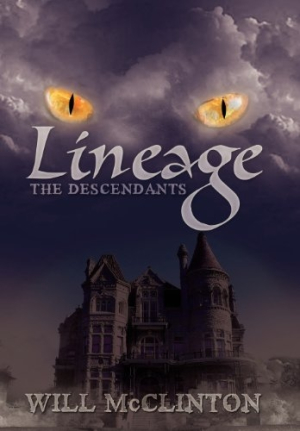Lineage
The Descendants
Whenever the protagonist walks into an old mansion and quips that “this place has a strange feel to it,” the reader knows that bad things are about to happen. They happen in spades to Marc DuBois and many of the others who populate Will McClinton’s erotic horror novel Lineage: The Descendants.
McClinton drops hint after hint of what is to come, but, like teenagers in slasher movies, DuBois and his friend Khalid never seem to pick up on the clues. Despite a caution from his mother that “there are dangerous secrets you need to know about our family,” and a friend noting that “having dead relatives contact you sounds like a warning to me,” DuBois blissfully hops from bed to bed, clueless for over one-hundred pages that he and Khalid are being used by a coven of modern-day witches as part of their plan to recall an ancient Sumerian demon.
The story is engaging, engrossing, and erotic, but also endless. By page four-hundred, McClinton loses focus and his writing becomes repetitive. He turns the demon from evil to ally, conjures yet another Mesopotamian evil spirit, calls up the ghost of Madame Du Barry, and brings in a defrocked Jesuit and a Muslim imam for an exorcism. The ending is unsatisfying, but by then most readers will likely be exhausted and therefore pleased to have the plot concluded.
McClinton has crafted a good story, but it is not an easy one to read. He writes in incomplete sentences, which can be both confusing and irritating. Many chapters are written as if they are scripts for a movie or play, with the first names of the characters preceding each line. Other chapters read like director’s notes for a stage or television production. In some instances, notably page 125, McClinton suddenly (but temporarily) shifts the narrative from third to first person, with DuBois directly addressing the audience.
There is a lot of color and sex in the book, and as an erotic horror novel, it is quite steamy, if a little furry. This is because every time Marc and Khalid have sex with one of the many witches, they grow not just hair but a pelt, as the sorceress’ spells are turning them into satyrs. Silly yet salacious though it may sound, it is actually a lot of fun, especially in the first half of the book before the two ladies’ men come to realize they are being used and groomed for a sexual sacrifice.
Overall, McClinton’s book is enjoyable, but it could be a lot more so if it were trimmed and focused. The staccato of incomplete sentences, the shifts from novel to screenplay and back again, and the changes in voice all get in the way of what is otherwise an entertaining story of sex and sorcery set, of all places, in Rochester, New York. McClinton includes a lot of detail and flavor to bring the reader to that city and into the mansions, clubs, and lifestyles of its wealthy, young-adult society. He also knows how to drop in a good presaging cliché, among them, “The place is frightening. If I were looking for a haunted house, I would look no further.”
Reviewed by
Mark McLaughlin
Disclosure: This article is not an endorsement, but a review. The publisher of this book provided free copies of the book and paid a small fee to have their book reviewed by a professional reviewer. Foreword Reviews and Clarion Reviews make no guarantee that the publisher will receive a positive review. Foreword Magazine, Inc. is disclosing this in accordance with the Federal Trade Commission’s 16 CFR, Part 255.

